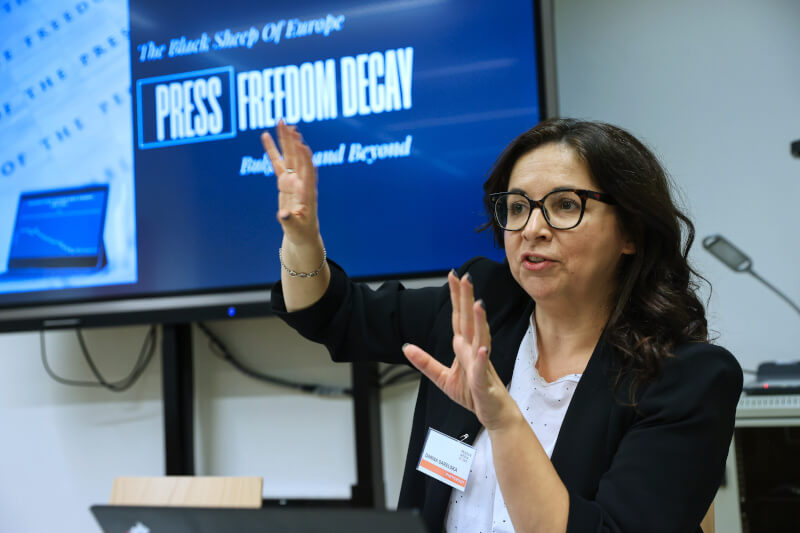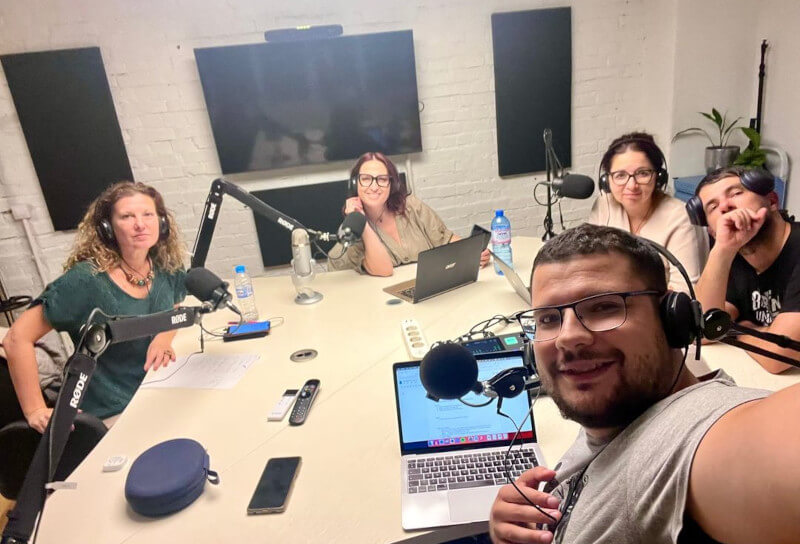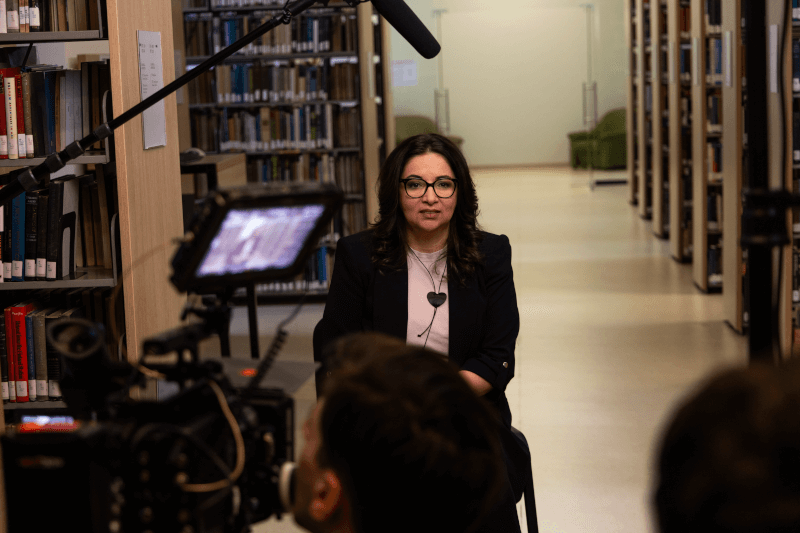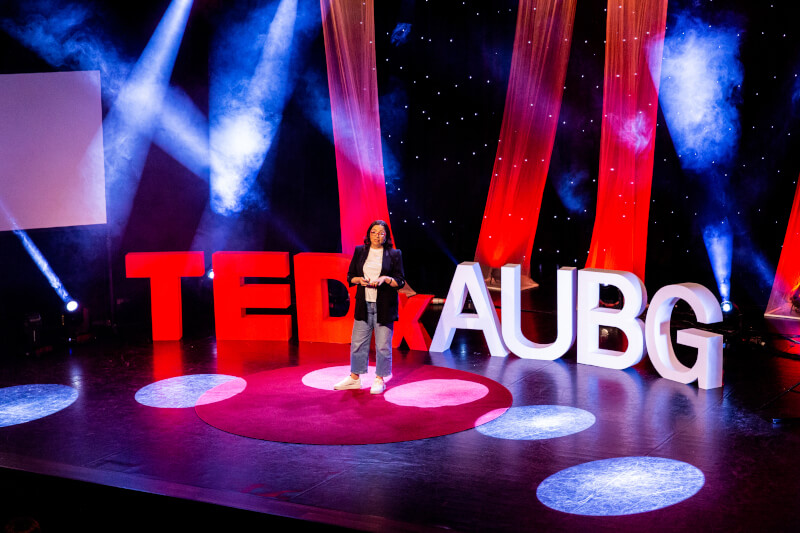
If television were a sport, Darina Sarelska would be in a special league. Not only did she help modernize television news production in Bulgaria in the 2000s and 2010s, but her work was at least partially responsible for turning the two largest private TV stations in Bulgaria into leading news sources for Bulgarians.
As an executive producer at bTV and later as news director at Nova, she left a strong mark on some of the most popular news and current affairs programs on the Bulgarian airwaves.
After obtaining a doctorate in journalism from the University of Tennessee, Knoxville, in 2021, she turned to teaching — a profession she has come to love because, as she says, “I want to talk to young people.”
She does it in classrooms at the American University in Bulgaria and as a guest lecturer at New Bulgarian University and in the America for Bulgaria Foundation’s Media E:volution program for young journalists.
She also talks to the Millennial audience of Television on the Radio, a talk show podcast she co-hosts with noted Bulgarian TV journalists Miroluba Benatova and Anna Tsolova.
We talked to Darina about Television on the Radio, about her conversations with young people, and about her passion for media literacy, the subject of a new class she teaches at the American University in Bulgaria.
America for Bulgaria Foundation: One hundred percent of your work today is focused on youth. What drew you to working with young people?
Darina Sarelska: I worked in Bulgarian media for 20 years in leadership positions, and I am ashamed and owe young people a debt because, in my capacity as news director, I should have done more to develop internship programs. It’s not that I didn’t want to — I didn’t have the time. I’ve also had an attitude that “we’re here to work, we’re not here to teach,” which is a mistake because that’s something you learn all your life and learn on the job in the newsroom.
Even on your worst day and in your most stressed state, it would be good not to have told a young person something you would be ashamed of, should you be reminded of it. We had this incident with a colleague, whom I met years later, when we were in completely different roles, and I said to her, “Do you remember me coming to you asking for an internship?” “No, I don’t remember that. Did I behave well?” I told her, “No, you didn’t.” “Why, what did I tell you?” I told her, “I’m a first-year university student, I come from Zlatograd. I really want to help you, I’m very interested in politics.” She replied: “You can’t help me.”
Knowing what I know now, I claim I could have helped her. My students really help me understand what kind of audience is growing up, that they don’t want to do what we’ve been doing all our lives.
I don’t believe I reproduced this attitude in the same way, but I didn’t do enough either because I did not have time for youth. And that’s the norm in many newsrooms until today. Because of a lack of time and strategy. That’s why the Media E:volution program is so valuable. Media professionals’ commitment to an internship program is much stronger when they have a partner like the America for Bulgaria Foundation, and so is the motivation of the intern and the motivation of the receiving media organization, as well as the benefits for that organization because they are dealing with people who come prepared. Interns go through a selection process, then have a theoretical part where they meet people from the industry and are given clear instructions about what is required of them and where they can be useful in the industry.
ABF: It sounds like you appreciate learning from the young. What do you learn from them?
D.S.: I’m learning not to think that just because I have experience, my way is the only way. I’m learning not to think that just because I’ve done something a hundred times, that’s the only way it can be done the 101st time. To question my own beliefs.
The industry is changing, the demands of the audience are changing, and I may know better what the best professional practices are, but they are the audience. They better understand their generational needs and how they consume media. That’s how I got into podcasts. When I asked my students how they get their news, they didn’t tell me, “We watch bTV, Nova, or the BBC.” They told me, “Usually on TikTok, but when we want something more in-depth and on a topic that we care about, we listen to podcasts.” What podcasts? Den. I hadn’t heard of Den, and I’m currently doing a podcast on that network.
I want to talk to young people.
ABF: And what are the most important lessons you wish to pass on to the next generation?
D.S.: It may sound like a cliché, but it’s not about me teaching them lessons. That is how our teachers tended to lose our attention — by talking at us, teaching us lessons. It is not a matter of giving and taking lessons, but of exchanging ideas. I try to teach from my experience — I have always worked in television — but I can see that they are not interested in television. They don’t watch TV in the traditional, linear way. They watch videos, and they probably consume mainstream media content in other ways, but they prefer YouTube videos, shorter forms.
The esthetics are also different. I always thought that things should be kept super professional, that this and that should go in a frame, the lighting should be like this… At some point, I said to myself, “Okay, who says it has to be this way?” There is a new esthetic. The basics should be the same — that the facts are true and that the message is honest. Beyond that, I’m very inclined to step back from my own notions of what “high art” is and admit, “OK, they know this audience they’re going to be working for better than I do.” As early as my university years, I knew that the media couldn’t continue the way it had when print media was dominant, and I knew that not because someone told me so, but because I did not see myself in those old ways. I saw myself in TV. This was the next hot thing for our generation.

ABF: What do today’s youth want then? What are their aspirations in that regard?
D.S.: My students are not interested in politics, or so they say. Most of them have this response that feels somewhat coached, like something they picked up from someone else, that nothing useful happens in politics, that politics is a corrupt game by default. At the same time, they are very interested in changing the world. I tell them, “But this is politics!” “No, that’s activism,” they reply. OK, but political will is required to make something happen. Civil society is part of politics.
They are very sensitive about justice, about people who are deprived of basic human things just because they are a different race, come from a different background, or are misfortunate to have been born into a lower social class. They are very interested in causes, in disadvantaged groups, in mental health.
I come from a generation that protested in front of parliament when we were still students. But then for us, somehow, the connection between why politics actually matters and how it shapes our lives was very direct. We saw how politicians’ decisions directly affected our parents’ lives: we lived at a time of endless queueing in front of shops, rationing.
This generation was born into freedom and wealth. Overall, the world is a much better place to live in the last few decades. Education is better than it was 50 years ago. People live better, but we have this idea that everything is very bad.
My students are not that negative, but they don’t know about the existence of communism. This worries me a lot. For them, authoritarianism is something that happened during the Second World War, something to do with the Nazi abuses. However, much more recent Bulgarian history is continuing to reproduce itself in public life in a very direct way… I try to tell them about it through things that are closer to them, such as the communist ban on wearing jeans. This was a violation of personal freedom. And so was the ban on listening to music you like.
I think the idea that we are moving toward freedom limitations is not absurd, and I wish that young people become more alert to them and speak up when these steps are taken.
Precisely because I know that “giving lessons” doesn’t work, I try to convey these topics from the lives of older generations in conversations and through objects.
I remember very clearly how we were told as children: “What we talk about at home you don’t repeat outside!” I also remember how, in my very first attempts at journalism, it was difficult for me to get people in the street, in the so-called polls I was doing, to give their opinion on an issue. They turned me down. “No, thank you!” So I was really surprised when I did an internship in the United States in 2000. In Knoxville, Tennessee, I also polled people in the streets, and they would not only stop, they would talk to me, they’d be interested, they’d want to see themselves on TV, they’d want to say what’s on their mind. They had this belief that they had something important to say. Because the state of things depended on them. These are differences that may seem too small, but for me they are essential.
I’m not sure that people born in freedom can imagine what being afraid to speak your mind is like.
I’ve noticed a difference between my Bulgarian and my American students in how free they are to communicate with a professor. It takes one, two, three years until my Bulgarian students understand that they can talk to us and that we are not “the authority.” Even now, they ask me: “I have an idea for a story. Do you like it?”
The Bulgarian school system creates this hierarchical model where we do homework and projects to please the teacher. It takes a long time to empower these kids.

ABF: In addition to trying to empower them, what other teaching methods do you use? You mentioned using objects; your use of yarn, in particular, recently made the social media rounds…
D.S.: I’m trying to set a different tone. It’s not a class where I’m going to go in, write on the board, give tests, and tell them which story I like and which story I don’t like.
I used the yarn in my first storytelling class. The person holding the ball of yarn tells a story, then passes the ball to the next person. It is fun because it changes how we speak: from talking at each other to participating, contributing, saying what we think, and for that to not be true or false but an occasion to think more.
It is also a metaphor. Stories connect people. When you tell a story in an authentic, engaging, and sincere way, these threads become a web of meaning. That was the idea. It was very funny because then we had to untangle the ball, which had turned into a spider web in the classroom. Then someone exclaimed, “Professor, this is investigative journalism!”
ABF: In addition to courses such as Digital Storytelling and Broadcast Writing, you also teach a course on digital media literacy. What is digital media literacy?
D.S.: It’s the ability to understand the media, how they work, being able to read critically, understand why a headline was written the way it was. It is not necessarily to lie to or manipulate you, but to sell the newspaper or media product. Media literacy is much more than understanding the media, especially the social networks we live in. It teaches critical thinking, critical reading, which is very lacking in Bulgaria.
Bulgaria ranks last in media literacy in Europe [according to the 2023 Media Literacy Index of the Open Society Institute, ed.]. At school in Bulgaria, my children learn what types of black soil there are and what tomatoes are grown on what soil. They might become farmers, but the reality is that they are not in the fields — they are on TikTok and YouTube all day. There is no systematic literacy effort outside of the occasional homeroom class when someone comes in and warns you about predators on the internet.
Understanding media also means understanding that what you saw in a 30-second video online is probably marketing, an engagement strategy to keep you on the platform longer. No topic, major or minor, can be explained in a 30-second TikTok clip. We all want things to be easy and fast, but we need to understand the risks of oversimplification. There is a huge lack of basic things like distinguishing opinion from fact, understanding that popularity on social media does not make you an expert. “She has many followers, so she must know.” Not necessarily.
Literacy is being able to read and manage your life in social networks, in digital media in general, in a way that is not just safe, but that helps you grow, that helps you to communicate with others, extract information, know where to find information… Our education is still about memorizing facts. There’s ChatGPT now. You have to be critical, know the pitfalls of artificial intelligence, and this is not written in a textbook — it changes every week.
In the spring, at the American University in Bulgaria, we are starting a media literacy program in partnership with the Poynter Institute [a nonprofit educational and research institution based in Florida, USA, ed.]. The program will be open to university students who will be trained using Poynter’s media literacy methodology. The students will then travel around the country to teach these skills to their peers in high school. The trainers are called campus correspondents — media literacy ambassadors of sorts. It’s much more interesting when the conversation involves peers.
We all simultaneously produce and consume media content, and in that sense we have a responsibility. We have a responsibility, including in how we use algorithms, which prioritize clicks. If you don’t want to be shown yellow, sensationalist content, then don’t click! If your feed is showing it to you, it means that a friend of yours or you have clicked on something similar.
ABF: Aren’t we laying too much responsibility at every person’s door?
D.S.: People are already responsible, whether they realize it or not. Whether they fall prey to “Nigerian prince”, phone, or other scams or believe the next handsome political lie propagator, vote for them, and grow disillusioned with the result — they pay the price. They bear the consequences of their choices, whether the effect is as immediate as the Nigerian prince robbing them, or seeing their social security benefits siphoned off.
No, we won’t suddenly discover a “Brave New World” as a result of media literacy, but I think we can’t afford to ignore this topic anymore.
Young people and the elderly are most susceptible to and affected by disinformation — the former because they were born into a completely unregulated environment where “anything goes,” and the latter because they have been conditioned to think that “if it’s on the news, it’s true.”
The world is evolving, and we are adapting to it. We have become much more digital. This is why it is very worrying that media literacy is not taught at a much earlier stage in Bulgarian schools. Media literacy is part of civic education.

ABF: How do you see the role of the media in this changing environment?
D.S.: A solution to the media’s disrupted business model must be sought. For me it comes down to people paying for content. Media content is a product as well as a service to society. If something is free, you are most likely the product.
I’m a big believer in media crowdfunding. We already pay for streaming platforms; somehow it’s much more accepted to pay for content nowadays. But it seems to be more acceptable to pay for entertainment than for information. This is changing, though.
ABF: Tell us about the podcast with the curious title Television on the Radio. Who are you trying to talk to, and what about, with this podcast? Why this project now?
D.S.: We have three TV veterans behind the mike: Miroluba Benatova and Anna Tsolova, who are very popular TV personalities and longtime colleagues of mine, and I, a TV producer. The television part comes from the fact that we had a glorious past in television and, I think, no future. (laughs) As Anna says — and I really like her wording — “We don’t like television in its current state, and it is mutual.” This is simply not the kind of journalism and product that we believe in.
We started Television on the Radio because we decided we had something to say. There is no such thing as a former journalist! We also think there is a shortage of authentic voices. I call the pundits I see on the media “political influencers.” They always speak on behalf of someone and never as experts or citizens. This is very tiring and confusing. We want to hear different voices, and we think that we can be helpful by providing context for the news. People who have jobs, lives, priorities, and families cannot be asked to read 65 news items and remember what happened yesterday, last year, ten years ago…
We really took to audio. Podcasting as a format allows for considerable freedom of expression. Television is not that; television is about tight phrasing. Video itself is pretentious, restrictive. Even the smartest things said by a shaggy head have no chance of being heard. The visual medium is very limiting. With podcasts, we can have a real conversation that is not restricted by form. Audio enables an authentic exchange of ideas.
The other difference with television is that you have very direct contact with the listeners.
We are doing this project for the absolute freedom of our conscience, and it is completely non-commercial. But if listeners find value in it, they will support it. And this is our other test — whether we can create a sustainable business model by running a small boutique media enterprise.
Currently, the project runs entirely on personal funds and with the support of Vlado Petkov and Elenko Elenkov from Govori Internet and people who believe in the project.
So far, the feedback is very nice. And the best thing actually — and this is our third goal — is that we are a community. Our goal is not to convince listeners that we are right. On the contrary. We enrich ourselves in conversation in this process by which you say something and I listen to you — because my goal is not to defeat you, but to listen to you, because I believe that you can say something valuable that would be good for me. And it works.
Often there are those who disagree with us, and that is very good because this is also part of the civic dialogue that needs to be cultivated. I don’t agree with you about something, but you should still be able to say what I disagree with, and I’d rather hear it than shut myself in a bubble. We don’t have to understand each other, nor is it necessary for you to give in, just to understand that there is a different stripe of opinion, a different perspective.
We want to have live meetings with those who disagree with us the most and those who contribute the most interesting things. We want to have an exchange of ideas, not a passive audience.

